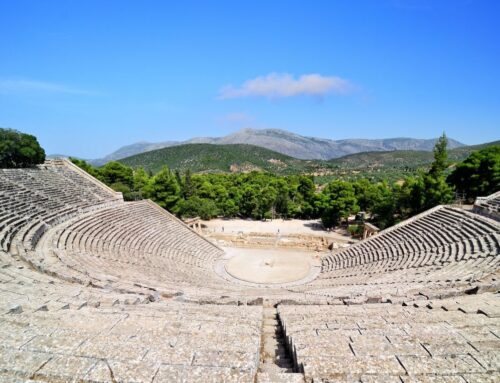The Top Ancient Greek History Facts For A Greek History Noob
The Top Ancient Greek History Facts For A Greek History Noob

☞ Table of Contents:
Greek history is fascinating. There is also a lot of it. Being the birthplace of Western civilisation Greece has centuries and centuries of history, a history so prominent that many of its concepts, important people and ideals are still very much relevant today. If you want to learn a little more about Greek history there’s nothing better than a no-nonsense guide.
This list of the Greek history facts will give any beginner the perfect overview of the essential facts you need to know before you visit Greece, and it’ll make sure you don’t look like a total novice when you arrive. Let’s get stuck in!
We have a quiz for you to do once you’re finished to see how many facts you’ve learnt, read until the end to take it!
Philosophers, There’s So Many I’m Confused
You’re right, there have been a mountain of incredibly influential and important philosophers come out of Greece. But to make things easier we’ll narrow it down so you have the top three. Socrates, Plato and Aristotle are probably the most well recognised Greek philosophers and together they can be accredited for forming the foundation of Western philosophy. Let’s sum up who they were with a little introduction.
Socrates is best known for believing that ignorance was a threat to society. He famously said that ‘True wisdom comes to each of us when we realize how little we understand about life, ourselves, and the world around us’. He forced elite Athenians and politicians to be critical and question their own truths. Sadly, it was this intellectual humility that he paid for with his life, eventually being put on trial and sentenced to death for his controversial way of thinking.
Plato was a student of Socrates and eventually became a philosopher himself. While Socrates didn’t actually document any of his work, Plato did, and it is from these that we have a comprehensive account of Socrates life and work. Plato devoted his life to helping people reach fulfillment and was intent on societal reform, finding the best way to govern and building a fair and just society. He founded his own school called the Academy in Athens.
Aristotle was a student of Plato’s and went on to become the tutor for Alexander the Great. His work stretched further than just the realms of philosophy, influencing that of the sciences as well. One of his prominent themes was that of the ‘Golden Mean’ – exercising moderation in all things. Like Plato, Aristotle founded his own school in Athens called the Lyceum.

Alexander The Great
Alexander the Great or Alexander the III of Macedon was the Macedonian king that ruled in Greece from 336 to 323 BC. Tutored by Aristotle, he went on to conquer much of the ancient world. His empire spanned from Macedonia to Egypt and even as far as India. His success led to him going down in history as one of the world’s best military generals and he was attributed to the widespread expanse of Hellenistic culture due to his vast reign.
Hippocrates And Medicine
Hippocrates is known as the ‘Father of Medicine’. He was a Greek physician who lived from about 460 BC to 375 BC and was responsible for beginning to treat medicine and health as a field of science, untying it from what was then considered a result of supernatural influences. Through rationality and conducting experiments he was able develop a rudimentary understanding of how disease and the body worked. He became one of the most important people in the history of medicine. He was credited to have said – ‘Let thy food be thy medicine and thy medicine be thy food’, believing that diet and exercise could in fact help most ailments.
The Spartans
Sparta is a city located on the Peloponnese in Greece. In ancient times it was home to the Spartans who were famous in antiquity for being powerful and lethal warriors. It was their duty to defend Sparta at all costs.
As far as Greek history facts go, the Spartans are always a favourite. You’ll probably be familiar with their depictions in movies like ‘300’. Here are a few facts that show just why the history of these fierce warriors still lives on today.
Spartans came to the height of their power when they defeated Athens in the Peloponnesian wars in 404 BC. In Sparta, one’s physical ability was more important than anything else. Young boys joined the military at the age of 7 and endured rigorous training until the age of 20.
This pride in physicality was not only limited to the boys, Spartan girls, who had more freedom than most women in Greece at this time, were allowed to exercise unclothed like Spartan boys and participated in athletics as well as undergoing a formal education.
☞ Related: The Women Rulers Of Ancient Greece We Need To Remember
An Unusual Proposal
A weird and wonderful Greek history fact that might strike you as quite unusual has to do with an apple. Biffing an object at someone’s head doesn’t really sound like an act of love does it? But in Ancient Greece it was. According to Greek mythology the apple is sacred to the Goddess Aphrodite and to throw and apple at someone is an act of love and if the suitor caught the apple it meant that the feelings were reciprocated!
The Greek Playwrights
In ancient Greece theatre was an integral part of society. It enabled one to investigate the human condition and ultimately led to a greater understanding of life itself. It was so important that the Festival of Dionysus took place in ancient Athens and theatrical performances of dramatic tragedies were held to honour the God Dionysus. At this time there were three notable genres of drama: comedy, satyr and, arguably the most important, tragedy. The most famous Greek playwrights who are often referred to as the three tragedians were Aeschylus, Sophocles and Euripides
Aeschylus: Often referred to as the ‘Father of Tragedy’ Aeschylus wrote over 80 plays but only 7 survive. He won the tragic contest at the Festival of Dionysus 13 times and introduced a second actor where previously Greek drama was limited to just one. Aside from the protagonist, the second actor, or deuteragonist, allowed for much more versatility in dialogue, revolutionising theatre at the time.
Sophocles: Sophocles wrote over 120 plays but only 7 survive, he surpassed Aeschylus at the Festival of Dionysus, winning 24 times. His major contributions to Greek theatre include increasing the size of the chorus, introducing a third actor and adding scene paintings, providing atmosphere and realism to the surrounding set.
Euripides: Although he only won the contests at the Festival of Dionysus 4 times, Euripides work became extremely popular in the years following his death and this popularity is often attributed to a total of 18 of his plays surviving today. His major contributions to Greek theatre include the immersion of comedy into his plays creating tragicomedies. He was also unique in his sympathetic portrayal of women in his plays.
☞ Related: Greek Words In English That Will Surprise You
The Epics
Homer was a Greek poet who lived in the 8th century BC. He is famous for producing the oldest and best-known works in the history of Western literature.
The Iliad tells the legendary story of the Trojan war, while the Odyssey follows the Greek hero Odysseus’ journey home to Ithaka after the war. Despite the age of these texts one fact remains the same, Homer’s epic poems are as influential today as they were hundreds of years ago.
☞ Related: Top 4 Greatest Modern Poets Of Greece You Should Know About
Here is a little quiz to test how many Greek history facts you’ve learnt.
Q: Are Socrates, Homer and Aristotle the 3 most famous philosophers?
A: No, Homer was in fact the Greek poet who wrote the Epics. Socrates, Plato and Aristotle are the 3 most important Greek philosophers
Q: Was Hippocrates a philosopher, poet or physician?
A: Hippocrates was a Greek physician
Q: Which Greek playwright portrayed women sympathetically?
A: Euripides
Q: What are the titles of the 2 Greek Epics?
A: The Iliad’ and ‘The Odyssey
Q: What would you throw at someone to declare your love for them in ancient Greece?
A: An apple
*Disclaimer: This page might include affiliate links. If you decide to book something through one of them, I might get a little bonus, but it won't cost you anything extra.*




























